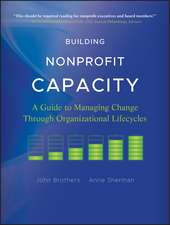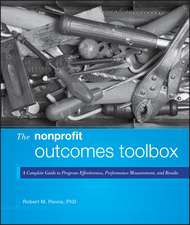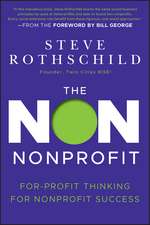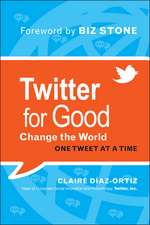Advocacy Organizations and Collective Action
Editat de Aseem Prakash, Mary Kay Gugertyen Limba Engleză Paperback – 24 noi 2010
| Toate formatele și edițiile | Preț | Express |
|---|---|---|
| Paperback (1) | 290.76 lei 6-8 săpt. | |
| Cambridge University Press – 24 noi 2010 | 290.76 lei 6-8 săpt. | |
| Hardback (1) | 559.07 lei 6-8 săpt. | |
| Cambridge University Press – 24 noi 2010 | 559.07 lei 6-8 săpt. |
Preț: 290.76 lei
Nou
Puncte Express: 436
Preț estimativ în valută:
55.65€ • 57.94$ • 47.03£
55.65€ • 57.94$ • 47.03£
Carte tipărită la comandă
Livrare economică 07-21 martie
Preluare comenzi: 021 569.72.76
Specificații
ISBN-13: 9780521139670
ISBN-10: 0521139678
Pagini: 336
Ilustrații: 5 b/w illus. 7 tables
Dimensiuni: 152 x 226 x 15 mm
Greutate: 0.52 kg
Editura: Cambridge University Press
Colecția Cambridge University Press
Locul publicării:Cambridge, United Kingdom
ISBN-10: 0521139678
Pagini: 336
Ilustrații: 5 b/w illus. 7 tables
Dimensiuni: 152 x 226 x 15 mm
Greutate: 0.52 kg
Editura: Cambridge University Press
Colecția Cambridge University Press
Locul publicării:Cambridge, United Kingdom
Cuprins
Introduction: 1. Advocacy organization and collective action: an introduction Aseem Prakash and Mary Kay Gugerty; Part I. The Institutional Environment and Advocacy Organizations: 2. The price of advocacy: mobilization and maintenance in advocacy organizations McGee Young; 3. Acting in good faith: an economic approach to religious organizations as advocacy groups Anthony J. Gill and Steven J. Pfaff; 4. Institutional environment and the organization of advocacy NGOs in the OECD Elizabeth A. Bloodgood; Part II. Advocacy Tactics and Strategies: 5. The market for human rights Clifford Bob; 6. Brand identity and the tactical repertoires of advocacy organizations Maryann Barakso; 7. Shopping around: environmental organizations and the search for policy venues Sarah B. Pralle; Part III. International Advocacy and Market Structures: 8. The political economy of transnational action among international NGOs Alexander Cooley and James Ron; 9. Advocacy organizations, networks, and the firm analogy Jesse D. Lecy, George E. Mitchell and Hans Peter Schmitz; 10. Shaping civic advocacy: international and domestic policies towards Russia's NGO Sarah L. Henderson; Part IV. Towards a New Research Program: 11. Rethinking advocacy organizations? A critical comment Thomas Risse; 12. Conclusions and future research: rethinking advocacy organizations Mary Kay Gugerty and Aseem Prakash.
Recenzii
'This book brings together a top-flight team of scholars to address the factors that help shape the advocacy activities of international NGOs. Complementing previous research but starting from a different perspective than most, the chapters show that leaders of NGOs must establish their organizations' individual identities, maintain their memberships, and worry about survival. Advocacy strategies are influenced, then, by these concerns as well as by the moral convictions of their members. An important contribution sure to inform as well as provoke.' Frank R. Baumgartner, University of North Carolina, Chapel Hill
'Prakash and Gugerty have assembled an unusually innovative and imaginative set of essays on interest group advocacy. This important collection advances the field with its emphasis on organizational behavior.' Jeffrey M. Berry, Tufts University
'Rather than characterizing advocacy organizations by their distinctive ideals and the intentions of their members, the contributors to this important new volume ask what can be learned by exploring the similarities with profit-oriented firms and collective action projects. The result is a collection of rich, theoretically-engaged case studies that significantly advance our understanding of the structure and strategies of advocacy organizations while generating compelling new questions about norms and shared values.' Elisabeth Clemens, University of Chicago, and author of The People's Lobby
'Prakash and Gugerty have assembled an unusually innovative and imaginative set of essays on interest group advocacy. This important collection advances the field with its emphasis on organizational behavior.' Jeffrey M. Berry, Tufts University
'Rather than characterizing advocacy organizations by their distinctive ideals and the intentions of their members, the contributors to this important new volume ask what can be learned by exploring the similarities with profit-oriented firms and collective action projects. The result is a collection of rich, theoretically-engaged case studies that significantly advance our understanding of the structure and strategies of advocacy organizations while generating compelling new questions about norms and shared values.' Elisabeth Clemens, University of Chicago, and author of The People's Lobby
Descriere
A new agenda for studying advocacy organizations which treats them as 'firms' operating in policy markets.














